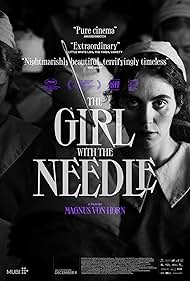She meets Dagmara, who runs an underground adoption agency
Chronology
Copenhagen 1919: A young worker finds herself unemployed and pregnant. They form a strong bond, but her world falls apart when she discovers the shocking truth behind her work. Denmark’s official entry for Best International Feature Film at the 97th Academy Awards in 2025. It’s the final days of the Great War, and Karoline barely survives on her factory job.
When was the rampant drug use of the era so honestly portrayed?
She considers herself a widow because her husband disappeared during the war (even though Denmark wasn’t actually involved), but she doesn’t receive widow’s benefits because he wasn’t listed as deceased. There’s a lot going on in the movie, and I don’t want to get into spoilers, so I won’t go into much detail about the plot, except to say that the marketing emphasizes something that doesn’t play as big a role in the movie as you might expect. While the second half of the film does a lot of attention to this, the real value of the film for me is the sense of reality surrounding Karoline’s story. When was the last time someone in a film tried to convince a potential tenant to rent an apartment by telling them they could have running water for two hours a day (from ten to noon, which might not be such a good idea) at the time, since most people would be working those hours?
Although Dagmar is the main character, the film is clearly about Karoline and her hardships
Even what Dagmar does was relatively common at the time, although I would venture to guess that by this point it was on the decline and not happening as often as it had before. I might have really enjoyed the film more if the marketing had been different and Dagmar hadn’t been brought up to create expectations. On the other hand, it’s hard to say how I would have felt seeing Dagmar Overby’s name on the door if I hadn’t known ahead of time that this was a real person being used in the film. (It’s worth noting that the film is inspired by real-life events, not based on them, so it tries to maintain a certain distance from the real Dagmara.) I have a feeling that some viewers will find it hard to sympathize with Karolina, because at times it seems like she makes the right decision a little too late.
I like the look of the film
At the same time, she doesn’t have much time or opportunity to practice ethics when you’re just trying to survive in a world where you have great odds. On the other hand, even though we know that the hope she gives would be useless in this world, we still understand why she gives up. It’s black and white, and the entire city seems rundown and barely holding on. It reminds us of the lack of concern for prosperity, and even contempt for the working poor.
Have things really changed that much?
The time depicted was over a hundred years ago, but the concept of female bodily autonomy is again under constant attack. Of course, all art is in a sense a mirror of the time in which it was made, but it’s just easier to see the similarities here.























